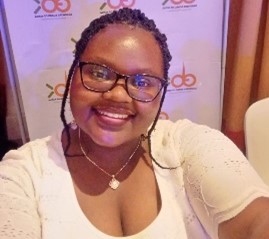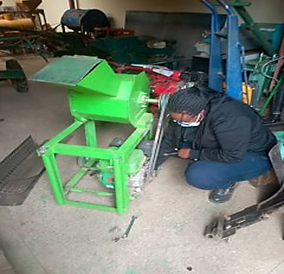This blog is written by Njeri Ngugi, a female Graduate Engineer who finalising her Master’s degree in Environmental and Biosystems Engineering.
Feature image: Njeri Performing routine maintenance on feed chopper, Kenya, 2023. Credit: Njeri Ngugi
“Achieve Gender Equality and empower women and girls” is the stated goal of United Nations Sustainable Development Goal 5 (SDG 5). The UN and Constitution of Kenya, 2010 acknowledges gender equality as a fundamental right and cornerstone of a sustainable, peaceful, and prosperous global community. Gender equality pertains to equal access to health care, legislative representation, economic processes, education and decent work.
I define mentoring as when someone (a mentor), shares their knowledge, skills, and experience with another person (a mentee), to help them to progress. It is a relationship between two people with the goal of professional and personal development.
I believe we all should wear both caps. Seek guidance from those with more knowledge and/or experience whilst guiding others.
The underrepresentation of women in Science, Technology, Engineering, and Mathematics (STEM), particularly in Africa and even in my country Kenya, is a challenge that demands innovative solutions. We continue to face barriers in pursuing STEM careers, ranging from cultural stereotypes to limited access to educational resources amongst others. Mentors serve as living examples that debunk myths and demonstrate that success knows no gender.
Statistics Confirm Power of Mentorship for African Women Engineers
According to a 2021 UNESCO report on Unlocking the Potential of Girls in STEM in Kenya, women make up 35% of students in STEM in higher education worldwide.
I am a Kenyan graduate engineer under the Engineers Board of Kenya (EBK) – the Kenyan statutory body that registers and accredits engineering programs offered by universities. As of January 2024, out of the 21,769 registered graduate engineers in Kenya, only 3,010 are women, representing a paltry 13.8 percent.
“If you cannot see where you are going, ask someone who has been there before.”
J Loren Norris
Over the years, I have sought mentors at various stages of my life and career. I have not only gained knowledge and skills but also obtained invaluable tips about challenges faced and those expected in pursuing my education and career.
There are initiatives across Africa actively mentoring women in STEM. These initiatives are actively working towards bridging the gender gap in STEM fields by providing mentorship, training, networking, and support systems that empower African women to excel and thrive in STEM. They include African Women in Science and Engineering (AWSE), Society of Women Engineers (SWE) Africa, TechWomen Africa, African Women in Agricultural Research and Development (AWARD) and Next Einstein Forum (NEF) Fellows Program. I would like to highlight two more that have transformed my career.
The Institution of Engineers of Kenya (IEK) has a mentorship platform under the Women Engineers Chapter. By linking mentees with established professionals, the mentorship program provides access to a broader range of opportunities, including internships and collaborative projects. Additionally, mentoring enhances personal and professional networks, making job hunting easier when the time comes. Engaging with women engineers has played a pivotal role in boosting my confidence and challenging stereotypes that discourage women from entering and building engineering careers.
I am currently a mentee under Mentoring future women graduates in STEM in Africa implemented by the University of Plymouth and funded by the Royal Academy of Engineering (RAE). My mentor Euphresia Luseka has guided me in career mapping and held me accountable to achieving my goals. She encouraged me to envision myself in leadership roles within STEM. As mentees progress in their careers, they often become mentors themselves, creating a ripple effect that contributes to a sustainable increase in the number of women pursuing and excelling in STEM fields.
African women in STEM should proactively utilize such programs that aim to connect them with experienced mentors, offering support, guidance, and networking opportunities to advance their careers in STEM.
Finding Your Mentor and Grow Towards Your Goals
A mentee must identify what you hope to achieve through mentorship. Clarify your career aspirations, areas for improvement, or specific skills you want to develop. Leverage professional networks, both online and offline, to connect with individuals who align with your goals. LinkedIn and industry associations have been particularly helpful to me. Subsequently, identify potential mentors, initiate contact through a polite and concise message. Express your admiration for their work and articulate why you seek their mentorship.
The mentorship relationship needs to be built and nurtured. Where possible, invest time in building a relationship before formally asking for mentorship. Attend their activities, engage in discussions, or seek advice on specific topics to establish rapport. Define the structure, frequency of meetings, and specific areas you hope to focus on during the mentorship. Open communication is key to a successful mentorship.
Mindfulness in any relationship enhances gratitude and satisfaction, and mentorship is no exception. Explicitly recognizing the four pillars of mentorship (trust, respect, expectation, communication) strengthens the relationship and makes it more effective.
Paying it Forward keeps the Future of Mentorship Bright
“In learning you will teach, and in teaching you will learn.”
Phil Collins
For women in STEM fields, loneliness can be a major disincentive. Through the connection of women with similar experiences, mentoring fosters a sense of community. This network of support not only advances their career path but also makes the STEM field more diverse and inclusive.
In the quest to increase the number of African women in STEM fields, mentoring serves as a ray of hope. Mentorship programs have the capacity to unleash the full range of creativity and talent present on the continent by establishing a culture of support, encouragement, and direction.
As Our World in Data reveals, it is worth noting that while economic gender disparities are still prevalent and significant, they are now less than they were a few decades ago. As we celebrate the successes of women who have broken barriers in STEM, let us also commit to paying it forward, creating a future where the brilliance of African women in STEM shines as a beacon of progress and inspiration.
About the author:

Njeri Ngugi is a female Graduate Engineer finalising a Master’s degree in Environmental and Biosystems Engineering (Irrigation and Water Resources Engineering) and holds a Bachelor’s degree in Agricultural and Biosystems Engineering. She is registered with the Engineers Board of Kenya (EBK) as an EIA/EA Associate Expert with a passion for Integrated Water Resources Management, Multiple uses of water and the water-food-energy nexus. She is also a mentee with the Engineers Board of Kenya and Mentoring future women graduates in STEM in Africa project by the University of Plymouth and funded by Royal Engineering Academy UK.

